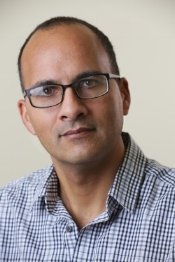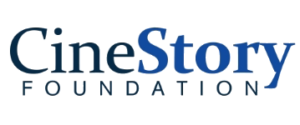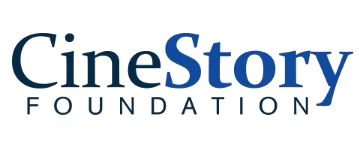First Person: Amyn Kaderali-Chokora
 Recently, CineStory’s Co-Executive Director Carlo Martinelli caught up with the 2016 CineStory Feature Fellow, Amyn Kaderali-Chokora. In 2017, Amyn directed two episodes of the CW’s “Supernatural” and just wrapped his third episode in February, 2018. He will return for additional episodes of the show in the fall. In addition, Amyn’s screenplay “The Christmas Calendar” is going into production with Kat Graham starring for a winter premiere on Netflix.
Recently, CineStory’s Co-Executive Director Carlo Martinelli caught up with the 2016 CineStory Feature Fellow, Amyn Kaderali-Chokora. In 2017, Amyn directed two episodes of the CW’s “Supernatural” and just wrapped his third episode in February, 2018. He will return for additional episodes of the show in the fall. In addition, Amyn’s screenplay “The Christmas Calendar” is going into production with Kat Graham starring for a winter premiere on Netflix.
In his conversation with Carlo, Amyn reflected on what he took from his experience as a CineStory Fellow and how that experience impacted his developing career.
Q: Tell us when you attended a CineStory retreat.
I attended the 2016 retreat.
Q: How was your experience in Idyllwild?
I had a truly great time at the retreat getting to know not only the mentors but also my fellow writers and hearing about their passion projects and unique backgrounds. The days were full from morning until night as there was always an interesting panel or discussion going on and the mentors really challenged the participants to get out of their comfort zones and to think deeply about their projects and the underlying themes we were working through in our own lives. There were plenty of laughs and a few tears but it really felt like a “safe space” where everyone’s opinions were valid. The mentors really seemed to care and were sincere in their efforts to help us make the best script possible. All in all it was a really memorable and rewarding time – I wish it could’ve been longer!
Q: Did the retreat have an impact on your writing, your view of the business, your career, etc.?
Absolutely. The script I brought to the retreat really benefited from the honest and constructive feedback I got, particularly from Meg Lefauve who was able to dive deep into the story’s themes and, in turn, help me focus the plot and explore new moments that illuminated the character’s psyche in ways I had not thought of. As for the retreat impacting my view of the business, I think my experience there made me a little less cynical about the “industry.” While some of my peers were from far away places, I had spent over a decade navigating the Hollywood maze, taking meetings and getting excited about possibilities only to see them die on the vine. Years of talk and very little action, in other words. So I came in a bit jaded and wary of the mentors, who could’ve just been patronizing and phony. Instead, I found them to be really genuine in their feedback and their encouragement because, at the core, we all love a great story. They are just hard to find and even harder to make. There were so many cool projects that the other attendees presented and the whole weekend was very inspiring. I definitely came home energized and eager to develop my scripts further but also to delve deeper into my own psyche about why I want to tell these particular stories.
Q: Your directing career has really taken off recently. Have you carried the knowledge you gained as a writer into your skillset as a director?
That’s an easy one. YES. The most valuable skill I gained that weekend (and continue to use every day) is to think about each particular story in a deeper way, in terms of what the screenplay is REALLY about and I apply that same approach to episodic TV. We read a 45 page script and we can see what happens. But what is really going on between these characters on a deeper level that will inform the performances, where the camera is placed, and what is driving the dramatic tension from start to finish? Is this scene about “trust,” “brotherhood” or “greed?” And also: where is the conflict? Forcing myself to question every moment in a script (of my own or one that has been handed to me to direct) leads to a deeper understanding of the story which can be internalized in the way I am thinking about how to execute this story on screen. That’s proven to be so incredibly valuable to me these past two years.
Q: What was your experience with the CineStory mentors like, and how did their feedback impact your work?
I had a really positive experience with my mentors. As the “Fellow” for that year, I was able to meet several times with my two mentors in LA- one is an executive at a production company and the other is an indie producer. I also was able to meet a few times with another producer I met at Cinestory. All three were not only encouraging but were interested and open to hearing (and sharing) projects and ideas. I’m still talking with them and hopefully we’ll collaborate on something concrete sometime soon. We’ll see. As for their feedback, strangely I didn’t really get much advice or suggestions on the project I brought to Cinestory (it is a pretty tough project to pull off that will require an international co-producer, most likely) but I was able to pitch other ideas and also get their advice on my career.
Q: As an Indian-American with parents from Tanzania and Scotland, your upbringing in the Bay Area was richly diverse, and this openness to a variety of cultural perspectives is a hallmark of your work. Have you seen an increased desire for stories from underrepresented voices in the marketplace?
I think each year we are chipping away at the severe underrepresentation of diverse voices in Hollywood. It’s a very slow process despite the fact that each year another movie or two shows everyone you can be diverse and successful (“Get Out” and “Black Panther” for example!) But there is still a severe lack of Asian and Latino stories finding success in the mainstream so we will continue to have to find ways to prove them wrong on both the big screen and on TV. Nevertheless, I am confident that the marketplace demands great stories no matter where they come from so hopefully the positive changes of the last couple years will begin to snowball.
Q: What advice would you give to emerging writers or filmmakers who are looking for a platform to get their work read, seen, and recognized?
That’s a hard question (which I get a lot). I think some competitions and retreats like Cinestory are great in terms of getting some opening exposure and starting relationships but ultimately, it’s about the work. Either you are presenting ideas that are irresistibly commercial or you are showing the reader a very original and compelling new voice or point of view that gets people excited. I do think good writing will get read even if it takes a lot of time and hustle. I also think we are living in a DIY moment and there is still merit to making your own short film or even a low budget feature that can play in festivals and open some doors. Also, you can’t be too results-oriented with your writing. Tell a story because it matters to you, not because you think it’s what the marketplace wants or because you think it’ll get into Sundance. These scripts take years to make so you need to be passionate about the stories you are telling because that is infectious and your script will hopefully find others who feel the same way.
Nothing in this industry is easy (unless you are Seth Rogen and can sell every silly idea you come up with while stoned with your friends). One last thing: I decided a long time ago that because being a writer (or director) is a hard road that can take many years, you have to have tremendous perseverance. If you really believe in yourself, you can never even think of giving up. Just keep on keeping on!



